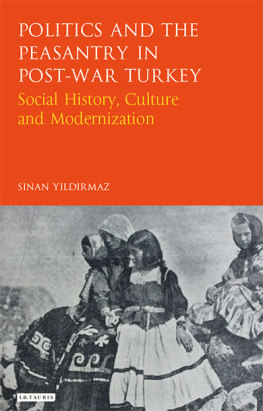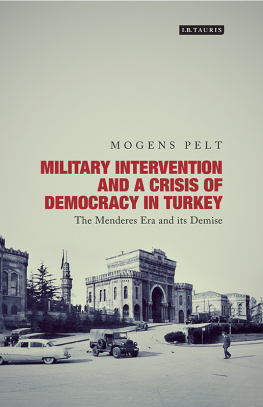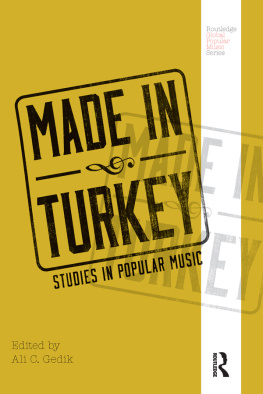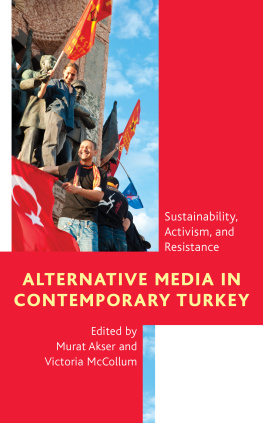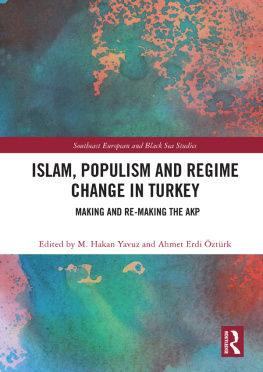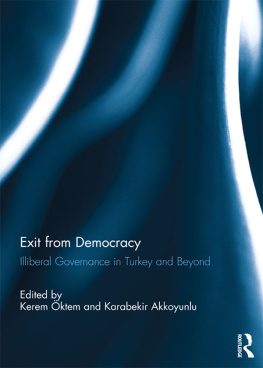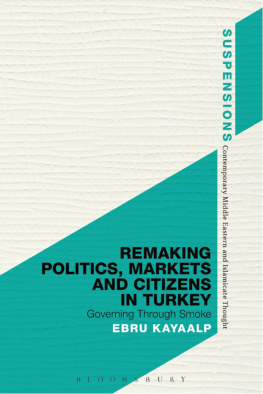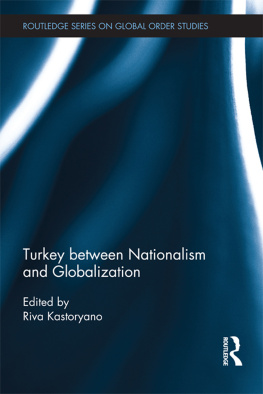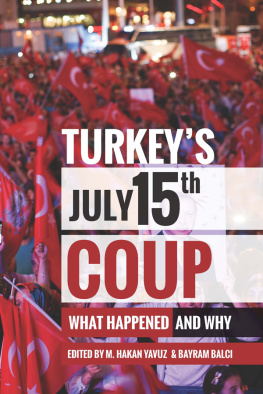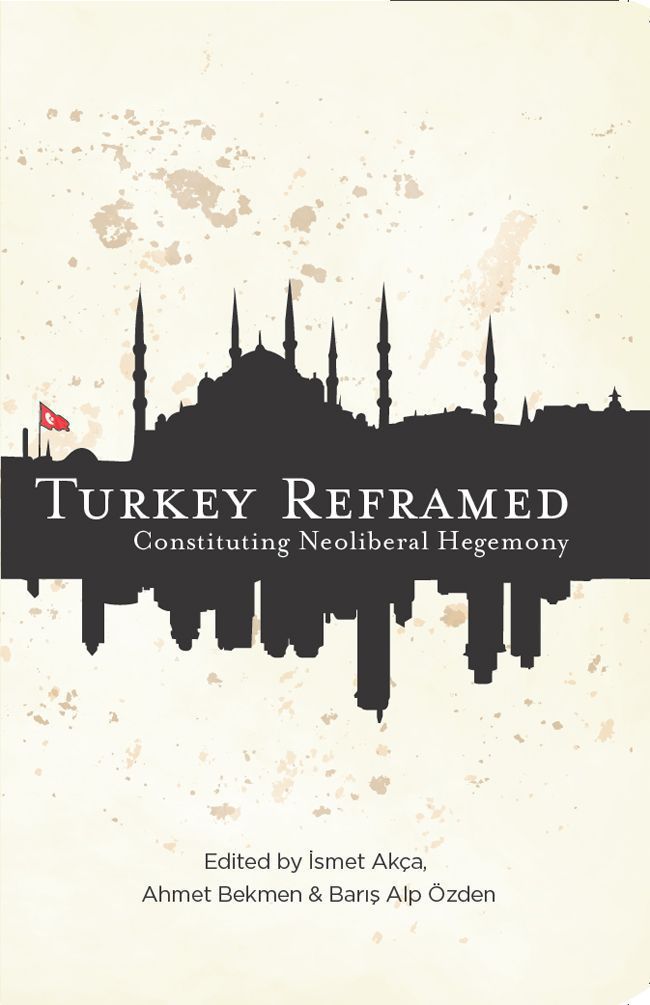Turkey Reframed
Turkey Reframed
Constituting Neoliberal Hegemony
Edited by smet Aka,
Ahmet Bekmen and Bar Alp zden
First published 2014 by Pluto Press
345 Archway Road, London N6 5AA
www.plutobooks.com
Distributed in the United States of America exclusively by
Palgrave Macmillan, a division of St. Martins Press LLC,
175 Fifth Avenue, New York, NY 10010
Copyright smet Aka, Ahmet Bekmen and Bar Alp zden 2014
The right of the individual contributors to be identified as the authors of this work has been asserted by them in accordance with the Copyright, Designs and Patents Act 1988.
British Library Cataloguing in Publication Data
A catalogue record for this book is available from the British Library
ISBN 978 0 7453 3385 4 Hardback
ISBN 978 0 7453 3384 7 Paperback
ISBN 978 1 8496 4979 7 PDF eBook
ISBN 978 1 8496 4981 0 Kindle eBook
ISBN 978 1 8496 4980 3 EPUB eBook
Library of Congress Cataloging in Publication Data applied for
This book is printed on paper suitable for recycling and made from fully managed and sustained forest sources. Logging, pulping and manufacturing processes are expected to conform to the environmental standards of the country of origin.
10 9 8 7 6 5 4 3 2 1
Typeset from disk by Swales & Willis
Simultaneously printed digitally by CPI Antony Rowe,
Chippenham, UK and Edwards Bros in the United States of America
Contents
Introduction
smet Aka, Ahmet Bekmen and Bar Alp zden
Looking at parties in Britain, which party do you think is similar to the AKP?
We describe ourselves as conservative when it comes to family values.
When it comes to the economy, we are liberal.
And when it comes to income and poverty, we are socialist.
This response was given by Mehmet imek, the Minister of Finance of the Justice and Development Party (Adalet ve Kalknma Partisi AKP) government, while speaking as a guest at the Liberal Democrat Partys Friends of Turkey group in 2011. The reporting newspaper added that the audience all laughed at this answer. Beyond doubt, imeks statement indicates the self-confident position of a political party that has been governing Turkey for more than ten years, with an increased share of votes in every election, and that is generally considered to be the party most likely to govern for the foreseeable future. As imeks comments illustrate, such a strong position allows party officials to make hegemonic claims about almost every issue affecting Turkey: the AKP represents both the left and the right. This self-confidence is not restricted just to party officials. Recently, an AKP-inclined pop-singer, a media vulture, went to Caracas to join the funeral march for Hugo Chavez and attacked the so-called leftists of Turkey for their non-participation. Although right-wing politics, with almost all of its variations, has been the dominant and governing side in Turkish politics, as a result of the ongoing AKP era, it has become a respectable and positive, rather than reactionary, political identity, perhaps for the first time in its history. This edited volume is about understanding this reconfiguration of Turkish politics that British Lib-Dems reflexively laughed at.
The first decade of the 2000s, which was marked both by the major economic crisis of 2001 and by the coming to power of the ex-Islamist cadres organised under the AKP, has been a period of radical change in Turkish society and politics. The AKP era represents the reconsolidation of the neoliberal hegemony after the devastating effects of the 2001 crisis in particular and the 30-year painful constitution of the neoliberal hegemony in general. The main claim of this volume is that the AKP era, with all its peculiarities, should be contextualised within this general process of neoliberal hegemony constitution. Therefore, rather than discuss the hegemony of a political party, we discuss hegemony in its class terms, which has been put into effect and consolidated through the practices of a political party, namely the AKP. For us, the AKP matters in this context.
Throughout the 2000s, one symptom of this hegemonic struggle has been that the demarcations among political actors in Turkey have been radically rearranged, whether in line with or contrary to the call of the hegemonic actor(s). While moderate Islamists, conservatives and liberals have easily situated themselves on the side of the AKP, some circles of the left have also given credit to the process the AKP implemented by considering it as democratisation, since it managed to make the military step back politically. In fact, this odd realignment has its intellectual and political roots in Turkeys recent history. One relatively new viewpoint on Turkey, which emerged after the 1980 military coup and gained popularity among intellectuals of both left and right during the 1990s, conceives of the peculiar character of Turkeys democratisation process as a struggle against the tutelage of bureaucratic elites, especially the Turkish military. This dissident but hegemonic analysis of socio-political power relations in Turkey argues that the main axes of political conflict have been dichotomies such as statesociety, centreperiphery, and bureaucracy bourgeoisie. Whereas the first element in each dichotomy represents repressive and authoritarian tendencies in Turkish politics, the second is considered either as the ensemble of democratic forces or as the fundamentals on which genuine democratisation can be based. Thus, to some extent, this was the Turkish counterpart of the state-civil society debate that took place in the 1980s and 1990s among Western and Eastern European intellectual and political circles (see Keane 1988). Similarly, it implies a changed focus of political enquiry and action. Thanks to the political clashes of the 2000s, basically between the blocs represented by the AKP and the high ranks of the civil-military bureaucracy, this particular viewpoint started to resonate with the policies of the AKP and has become a kind of political epistemology for Turkey. It is shared by people from widely different political backgrounds, whether liberals, liberal leftists, Islamists or conservatives.
By explaining the recurrent militarisation of political power relations in Turkey with regard to the will of the state actors, this analytical framework employed a state-centric theoretical approach. As Yalman comments, the post-1980 period has witnessed the rise of a state-centric (in analytical terms) but anti-statist (in normative terms) discourse, which has become hegemonic in academic and public milieus (Yalman 2002). Conventionally known as the strong state tradition (Heper 1985), this approach to the state is based on a series of arguments about Ottoman-Turkish history, produced by scholars from diverse theoretical and political traditions. These arguments centre around a peculiar historical continuity incarnated in a strong state-weak society tradition in Ottoman-Turkish history, the claim about the weakness of the bourgeoisie and its dependence on the state, the presentation of the cleavage between the bourgeoisie and the civilian and military bureaucratic elites as the main dynamic of power relations and social change, the everlasting dominance of a patrimonial statesociety relationship in which the highly independent state is not responsible to the social forces of the allegedly non-autonomous market economy.


